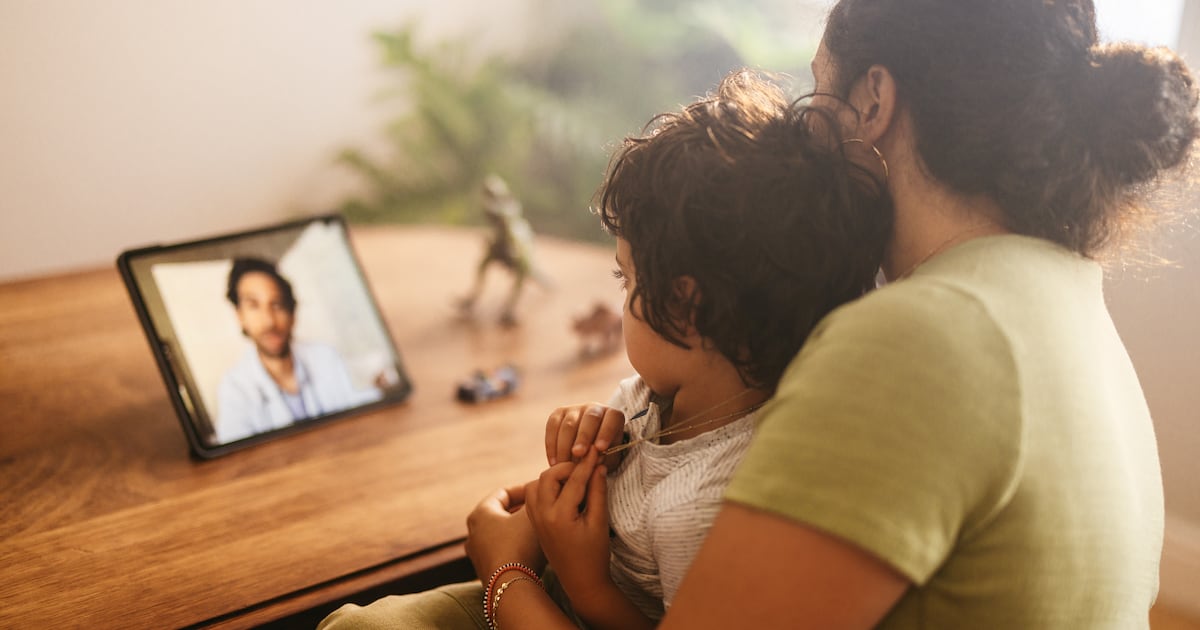Digital health care has the potential to support millions of refugees around the world who have been displaced from communities and live far from conventional services, a health technology conference heard.
Former refugees turned entrepreneurs and tech innovators revealed their experiences and how they had shaped new remote migrant services during the final day of the World Health Expo in Dubai.
The three-day conference heard how technology is playing an ever increasing role in health services, including for vulnerable people displaced from their homes and communities.
Experts said digital health can address the considerable challenges faced by refugees who have fled war-ravaged countries, such as access to diagnostics, screening and mental health support.
“There remains a lot of stigma around refugees, so it’s important to have that compassionate and inclusive approach towards migrant health care,” said Dr Waheed Arian, founder of Arian Wellbeing, an online mental health assessment service.
As a doctor in the UK, Dr Arian established the Arian Teleheal charity, after dealing with anxiety, depression and post traumatic stress disorder as a young refugee in war-torn 1980s Afghanistan. The charity enables doctors in conflict zones to use their smart phones to receive advice from global specialists.
Dr Arian said although migrant healthcare was widely neglected, the void could be filled with more remote access to digital health services.
“I experienced firsthand, along with millions of other people, what it is like to have no access to reliable health care and as a result of that, to lose family members,” he added.
“That’s an experience that has shaped how I see human beings who need access to basic health care and comfort. We look at refugees and map out their entire journey – from triage, to screening and assessment, all the way to therapy and beyond.”
Long-term impact of war
Services offered by Arian Wellbeing are adapted to meet the language, cultural, and spiritual needs of the populations served, while also addressing the long-term effects of war trauma, displacement and structural inequity.
“Often refugees have experienced a lot of trauma, whether it’s before their migration, during the journey, or after the migration in the countries they’re in,” said Dr Arian.
“We are mapping that journey and connecting them through an expert, by video call, audio call or text to provide them that support.
“In our work in the NHS in the UK, it brings in the schools, social services, community health services and also partners and non-profits for work, as well as commercial partners to find a solution for displaced people.”
Online support for the mental health of displaced people has proved successful elsewhere.
A study by the Ministry of Public Health Lebanon assessed how effective a step-by-step programme supported by the World Health Organisation was in helping Syrian refugees in 2020.
The study included 569 Syrian adults with an average age of 31, of which 58 per cent were women. A digital intervention designed to treat depression through an internet-connected device included weekly support with a 15-minute online consultation or phone call and a three-month follow up assessment.
Results showed those who received the digital intervention with remote guidance from trained non-specialist helpers showed significantly better functioning.
They were also significantly less depressed than those who received enhanced standard care in a control group.
Securing patient data
However, Nadia Kadhim, a human rights lawyer and CEO of Naq Cyber, an automated healthcare compliance platform, said protecting the data of vulnerable refugees when delivering digital health services remained a challenge.
“Everyone has the right to privacy, and that includes their data,” said Ms Kadhim during a WHX Tech panel event. “But what if those rights can’t be exercised because they’re not attached to a legal identity, which is the reality for millions of refugees around the world?
“Compliance and regulation is a massive barrier to entry for a lot of these great digital innovations, let alone when we’re actually talking about people who are extremely vulnerable in need of these solutions now.”
Improvements to health care for millions of Palestinian refugees are under way via the United Nations Relief Work Agency which is modernising health care delivery across 143 UNRWA health centres.
Clinics will use a unified electronic medical record system which can be accessed by about 3,200 staff across the agency’s five fields of operation in Syria, Jordan, Lebanon, the occupied West Bank and Gaza.
The secure, cloud-based system will replace the fragmented legacy platform eHealth from 2026.
Also speaking at the WHX Tech summit in Dubai, Dr Sam Shah, a digital health adviser at Neom in Saudi Arabia, said refugees accessing digital health would need to be confident their data was secure when accessing remote care.
“People are often scared how they identify themselves in the system, and about what happens to their data,” Dr Shah said. “Is that data going to be used in a way that would be used and abused against them, or will they be identified in a way that could have harmed them and damage their health?
“As decision makers, we must come up with regulation mechanisms that allow access and protect those individuals. That is a critically important point.”
More coverage from the Future ForumRace card
6.30pm: Emirates Holidays Maiden (TB), Dh82,500 (Dirt), 1,900m
7.05pm: Arabian Adventures Maiden (TB), Dh82,500 (D), 1,200m
7.40pm: Emirates Skywards Handicap (TB), Dh82,500 (D), 1,200m
8.15pm: Emirates Airline Conditions (TB), Dh120,000 (D), 1,400m
8.50pm: Emirates Sky Cargo (TB), Dh92,500 (D)1,400m
9.15pm: Emirates.com (TB), Dh95,000 (D), 2,000m
